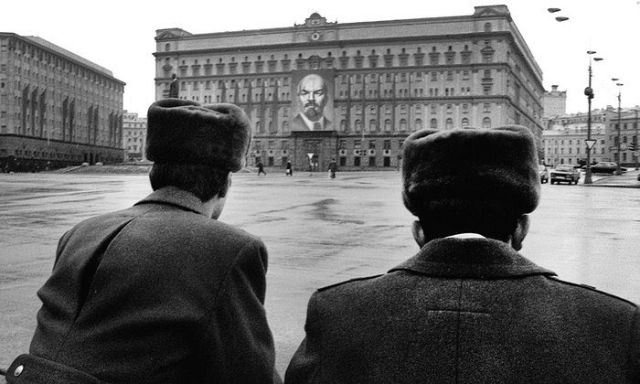Russia Plans to Resurrect KGB
MOSCOW – Russian state-media outlet Kommersant reported late Monday that the Kremlin will creates a new security apparatus that would resemble the Soviet Union’s infamous KGB as part of a massive restructuring of Moscow’s intelligence agencies.
According to Kommersant’s report, Russian President Vladimir Putin plans to create an all-powerful, fully independent security apparatus under its Stalinist-era name, the Ministry of State Security (MGB).
Kommersant reported that the new agency would be created ahead of Russia’s next presidential elections in March 2018.
The Kremlin has not yet commented on the report, and Putin’s usually outspoken spokesman Dmitry Peskov has refused to issue a statement on behalf of the administration.
The original MGB was originally founded at the behest of Josef Stalin's Georgian-born head of the NKVD, Lavrenty Beria, one of the masterminds behind the Great Terror of the 1930s, when millions of Soviet citizens were murdered of imprisoned in labor camps for crimes against the state.
The MGB was also responsible for the forced mass deportation of Crimean Tatars, Chechens, Ingushetians and Georgia’s Meskhetian Turks to Central Asia during World War II.
Following Stalin’s death, the ministry was reorganized as the Committee for State Security - KGB.
Russia's newly restructured agency would effectively reconstitute the old KGB, where Putin served as a lieutenant colonel from 1975 to 1990.
Reverse Restructuring
As the Soviet Union began to implode in late 1991, the KGB was broken up into separate agencies under the guise of the FSB, which also includes the Federal Protection Service (FSO) and the Foreign Intelligence Service (SVR). At the time, former Russian President Boris Yeltsin hoped to weaken the once powerful spy agency by splitting it into rival, separate divisions.
The reincarnated MGB will essentially fill the role of the KGB and assume control over all intelligence activities – including domestic, foreign and counter-intelligence operations – as well as have the power to provide investigative material for cases opened by law enforcement officials and federal prosecutors.
In further echoes of the sweeping powers of the KGB, the new ministry will be able to use its powers to prosecute dissidents, opposition party activists, human rights advocates, Journalists, civic activists and religious officials.
Social media speculation has centered on the idea that Putin fears mass protests during the presidential elections in two years and has opted to create a powerful KGB-style agency to hedge his bets.
Gennady Gudkov, a former KGB colonel-turned-anti-Putin-politician, told RFE/RL's Russian Service that he believed the Kommersant report indicates, "The country has made a conscious decision to pursue the worst-case scenario. It is entirely clear that Russia has gone from authoritarian to totalitarian.
At the height of its power in the 1950s-1980s, the KGB vast apparatus of spies, informants (reportedly including former Russian Orthodox Patriarch Alexey II, Russia’s current Grand Mufti Talgat Tadzhuddin and Georgian Patriarch Ilia II), prosecutors and bureaucrats had an iron grip on Soviet society; arresting human rights activists and persecuting those who wanted to leave the country including the Soviet Union's Jews.
Before Mikhail Gorbachev’s perestroika and glasnost initiatives, the KGB had become more powerful than the Soviet Union’s Communist Party.
Putin appears to be safeguarding his power base by not incorporating his new 400,000-strong praetorian guard – officially known as the National Guard – into the MGB’s security structure.
The National Guard was created in April to oversee Russia’s Interior Ministry troops, including OMON riot police and the SOBR special-forces units. The Federal Migration Service and Federal Drug Control Service were also placed under the National Guard’s authority.
By creating a powerful security force that personally loyal to Putin, he is guaranteeing that the new MGB will not be able to become its power base in the way the KGB was able to under Putin’s mentor Yury Andropov and Vladimir Kryuchkov – the latter of which led the August 1991 hardline coup that attempted to overthrow Soviet President Gorbachev.
Speaking to RFE/RL, Mark Galeotti, a Russian security services expert and senior research fellow at the Institute of International Relations in Prague said, "The suggestion is that a presidential security service will remain outside it. But basically speaking, this new ministry would reconstitute the KGB in all its aspects."
In the quarter of a century since the collapse of the Soviet Union – an event Putin has described as “the greatest geopolitical tragedy of the 20th century” – it appears he has now successfully resurrected its most sinister institution for today’s Russia.
By Nicholas Waller
PHOTO: Soviet MVD troops look out at the KGB's (now FSB) headquarters on Lubyanka Square in Moscow, December 1989












